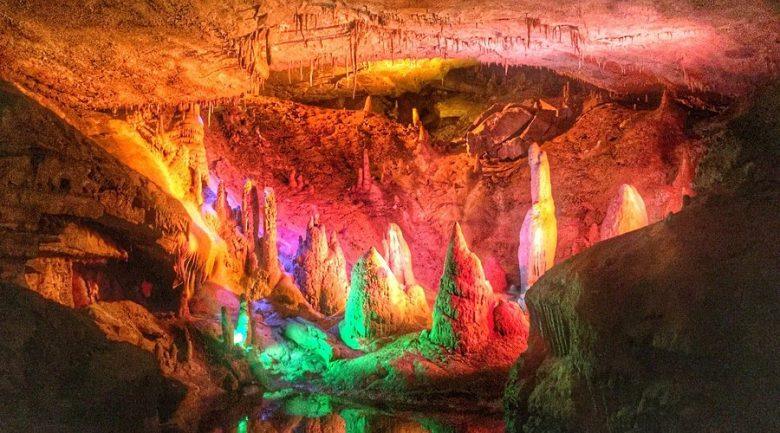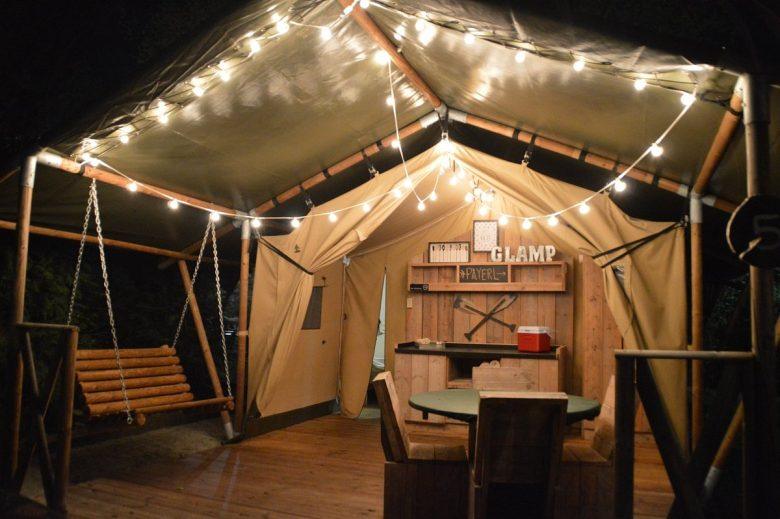Table of Contents
What is an RV?
RV stands for a Recreational Vehicle. It’s basically a home on wheels, designed for travel and temporary living. Inside, you’ll usually find sleeping areas, bathrooms, kitchens, and entertainment spaces with TVs or fireplaces. RVs can range in price from just a few thousand dollars to several hundred thousand, depending on size and amenities.
Some high-end RVs are nicer than apartments with granite countertops, leather couches, full-sized appliances like dishwashers and refrigerators, and even washers and dryers. These top-tier RVs offer more than your average campsite setup and easily fall under the glamping category, offering the best of both comfort and adventure.
In this guide, we’ll explore the different types of RVs, the pros and cons of RV living, the RV campsite options in the most popular national park in the U.S., the Great Smoky Mountains, and a final analysis on whether a Smoky Mountain RV trip is worth it or whether you should consider a glamping site instead.
What is the difference between an RV and a camper?
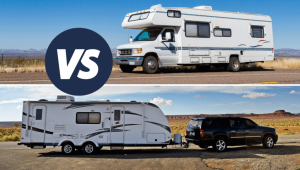
RVs, or motorhomes, are drivable. They have built-in motors and can be operated on their own without needing to be towed. Most come with built-in generators and electrical systems that allow you to run appliances without relying on a campground hookup. They’re easier to back into campsites and remove the hassle of hitching or unhitching anything.
Motorhome Classification
Motorhomes are categorized into three main classes — A, B, and C — based on the type of chassis, or weight-bearing framework, they’re built on. Here’s how they break down, from largest to smallest:
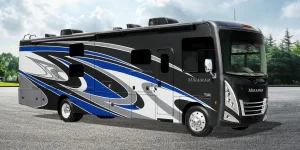
Class A Motorhomes: The biggest and often the most luxurious. Built on a commercial truck or bus chassis, these RVs range from 26 to 40 feet long and weigh 13,000 to 30,000 pounds. They offer lots of space and high-end features, some even have built-in garages for sports cars. However, they come with a higher price tag and lower gas mileage.
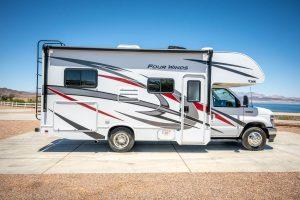
Class C Motorhomes: The in-between option. These are built on a cutaway van or smaller truck chassis and typically measure 20 to 30 feet long, weighing 10,000 to 13,000 pounds. Recognizable by the over-cab sleeping area, Class C RVs often feature a separate bathroom, kitchen, and extra sleeping space in the back. They strike a balance between comfort and affordability.
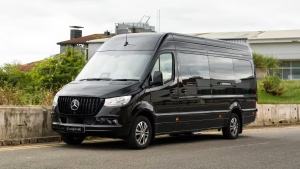
Class B Motorhomes: Also known as camper vans, these are the most compact and nimble. Built on a van chassis (like a Mercedes Sprinter, Ford Transit, or Ram ProMaster), they range from 17 to 23 feet long and weigh 4,000 to 9,000 pounds. While they offer fewer amenities, they’re easier to drive, can come in 4WD, and get better gas mileage. Perfect for solo travelers or couples embracing van life.
Campers do not have a motor and need to be towed by another vehicle. These include travel trailers, fifth wheels, and toy haulers. Toy haulers even come with garage space for your gear like bikes, ATVs, or kayaks. Because campers don’t include the engine or driving components, they often provide more usable living space in a smaller footprint.
Camper Classification
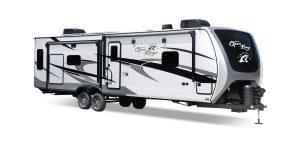
Travel trailers: The most common and versatile type of camper. They come in a wide range of sizes, from compact 12-foot teardrops to large 35-foot models with multiple slide-outs. Towable with most mid- to full-size trucks and SUVs, travel trailers can offer surprisingly spacious interiors, including kitchens, full bathrooms, and separate sleeping areas, all while being relatively easy to hitch and set up.
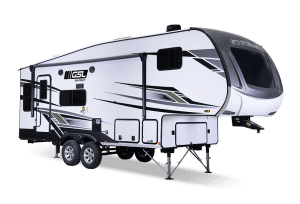
Fifth wheels: Larger, heavier campers designed to be towed using a special hitch installed in the bed of a pickup truck. This gooseneck-style connection provides greater stability and maneuverability compared to a standard bumper hitch. Fifth wheels often feature high ceilings, multi-level floor plans, and residential-style amenities, making them a popular choice for extended stays or full-time RVers seeking maximum comfort.
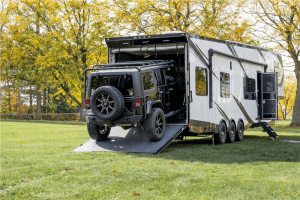
Toy haulers: Unique hybrids that combine living quarters with garage space. Designed for outdoor enthusiasts, they feature a rear ramp and dedicated storage area for equipment like motorcycles, ATVs, kayaks, or bikes. Many models offer flexible layouts where the garage can be converted into additional living or sleeping space, allowing you to bring along your gear without sacrificing comfort.
What are the pros of an RV?
Freedom to Explore
You’re not tied down to one location. You can go wherever the road takes you, while still having all the essentials of home with you.
Comfort Over Camping
Compared to traditional tent camping, RVs are significantly more comfortable. You’ve got heat and AC, a mattress, real bathrooms, and often a working kitchen.
Encourages Minimalist Living
RVs encourage simple living. With limited space, you only bring what you need. Less clutter, fewer distractions, and a focus on the experience.
Easy to Clean
Cleaning takes minutes, not hours. A smaller space means you spend less time maintaining and more time enjoying the trip.
What are the cons of an RV?
Social Stigma
Some people associate RV living with being transient or homeless, which can carry a social stigma, especially if you’re full-time on the road.
Lack of Separation
When your home is your vehicle, going on vacation doesn’t mean a fresh start. You’re just relocating your same four walls. And if you’re working remotely, your workspace might be your dining table, your couch, or your bed. There’s little separation, and that can take a toll. You might eat, work, and sleep in the same spot. That gets old fast, and it’s harder to mentally switch modes.
Lack of Space
Even high-end RVs have limited space. You’ll likely share most of your living area with others with little to no privacy, separate rooms, or office space unless you opt for a large Class A model.
Licensing and Paperwork
Larger RVs may require a special driver’s license, depending on the state or country. If you’re living full-time on the road, changing your residency can trigger extra paperwork and bureaucracy.
High Cost and Depreciation
RVs lose value quickly. Just like any other vehicle, they’re depreciating assets. On top of that, you’ll also have to deal with repairs, maintenance, fuel, and insurance. Add that to storage fees and registration costs, and it’s a significant financial commitment. Even basic RV sites average $60 to $80 a night.
When you start to factor in all of the costs, it doesn’t really make sense. The cost and the time commitment to RVs far outweigh the costs of a hotel or glamping site, where you can have all the amenities without the added headache of cleaning, maintenance, laundry, and storage. An RV isn’t a financial investment, it’s a luxury.
Smoky Mountain RV Parks
Below, we’ve done the research on what the most popular RV parks are for three major cities in the Smoky Mountains: Sevierville, Pigeon Forge, and Gatlinburg.
Sevierville
Buddy Bear in the Smokies
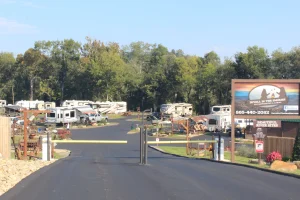
1518 Dolly Parton Pkwy, Sevierville, TN 37862
Buddy Bear in the Smokies offers a family-friendly campground with full hookup RV sites, including 20/30/50-amp electric, water, and sewer connections. It is located less than a 5 minute drive from Downtown Sevierville. Each site features a fire pit, grill, cable TV, and free Wi-Fi. Amenities include a swimming pool, clubhouse, pet park, playground, fishing access, and laundry facilities. Rates start at $80 per night for premium back-in sites, with riverside and pull-thru options priced around $85.
The Ridge Outdoor Resort
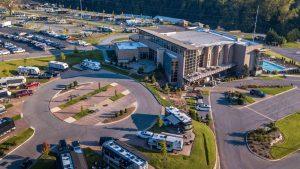
1250 Middle Creek Rd, Sevierville, TN 37862
The Ridge Outdoor Resort is an upscale RV destination featuring spacious concrete pads (62 to 100 feet), full 50/30-amp hookups, and resort-style amenities. It is located just outside of Pigeon Forge, about a 10 minute drive to the main strip where there are attractions like Dollywood, The Island at Pigeon Forge, and Wonderworks. Guests can enjoy free cable, internet, power and water, and site amenities like zero-entry pools, luxury bathhouses, family restrooms, fitness center, golf simulator, dog parks, recreation centers with pickleball and basketball, a kids’ activity room, and a well-stocked camp store. Nightly rates range from $88.99 to $159.99 for premier sites and up to $179.99 for signature sites with hot tubs, outdoor TVs, and fireplaces.
River Cove Campground
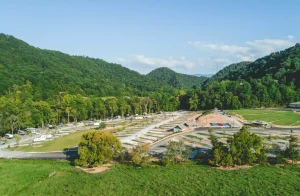
2575 Pittman Center Rd, Sevierville, TN 37876
Uncle Jim’s River Cove Campground is a peaceful riverside campground with full hookup RV sites (30/50-amp) that include water, sewer, cable, and Wi-Fi. Each site comes with a picnic table, charcoal grill, and fire pit. The campground is pet-friendly and offers a playground, fishing access, laundry facilities, a general store, and courts for basketball, volleyball, and pickleball. Average rates start at $55 per night for river loop RV sites.
Two Rivers Landing RV Resort
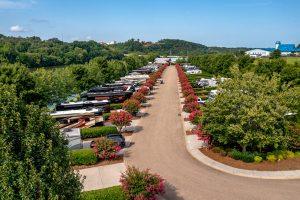
Two Rivers Landing is a high-end RV resort along the French Broad River. The park features full hookup paved sites with 30/50-amp service, landscaped grounds, and a gated entrance. Amenities include a riverfront heated pool, modern clubhouse with kitchen, private restrooms, and showers. Interior sites average $75–$85 per night, while riverfront sites typically range from $95 to $105.
Pigeon Forge
Gateway RV Campground
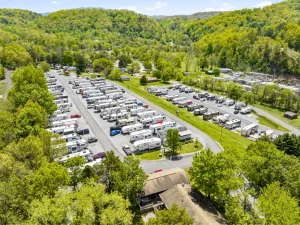
Gateway RV Campground offers a serene camping experience less than a mile from the Parkway in Pigeon Forge, providing easy access to local attractions while maintaining a peaceful atmosphere. The campground features approximately 250 RV sites equipped with full hookups, including 30/50-amp electric service, water, and sewer connections. Amenities include a swimming pool, playground, game room, laundry facilities, restrooms with showers, a general store, and a dog park. Nightly rates for RV sites start at $60 during the off-season and $85 during peak season.
Pigeon Forge RV Resort
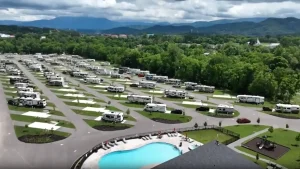
Pigeon Forge RV Resort is a family-friendly destination offering over 200 spacious RV sites with full hookups, including 30/50-amp electric service, water, and sewer connections. The resort boasts a resort-style pool with an exciting waterslide, community fire pits, a lodge with stone fireplaces, volleyball courts, and open green spaces. Its proximity to attractions like Dollywood and the Great Smoky Mountains National Park makes it a convenient choice for visitors.
Gatlinburg
Greenbrier Campground
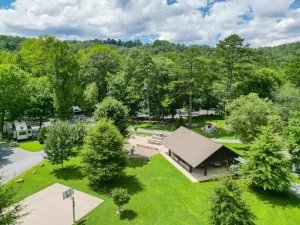
Greenbrier Campground offers a tranquil setting along the Little Pigeon River, providing a variety of sites for RVs, tents, and cabins. All RV sites include full hookups with 30/50-amp electric service, water, sewer, cable TV, and Wi-Fi. Amenities encompass a swimming area in the river, luxury bathhouses, a camp store, coin laundry facility, free game room, pavilion, outdoor billiards, ping pong, foosball, playground, fishing opportunities (license required), golf cart rentals, and seasonal activities like bounce houses, kids’ programs, movies, and live music. Nightly rates vary by season and site selection.
Gatlinburg East / Smoky Mountain KOA Holiday (Cosby, TN)
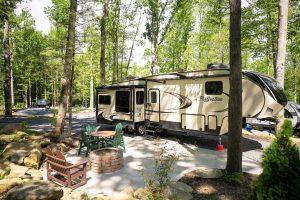
Located in Cosby, a 17 miles from downtown Gatlinburg, this KOA offers a range of accommodations, including RV sites with full hookups, deluxe cabins with kitchenettes or full kitchens and bathrooms, and tent sites equipped with fire pits, picnic tables, sand tent pads, and bear boxes. Amenities include a fully stocked camp store, Kamp K9 dog park, outdoor pool, Wi-Fi, disc golf, horseshoes, playground, pavilion, and access to nearby trailheads. This campground serves as a convenient base for exploring the Great Smoky Mountains National Park and local attractions.
Is RVing Worth It?
For most people, no.
The starting price of a spot in an RV park with full hookups is $60, and you still have to bring your own motorhome and supplies, not to mention the added headache and time spent having to pack, set up, clean, and maintain the vehicle. The nightly rate of a luxury glamping site can be as low as $150 a night, inclusive of supplies, linens, cleaning, and an overall better, stress-free experience where you’re able to actually enjoy your vacation. To top it off, you’re losing money with an RV. The RV itself, if purchased, will continue to lose value as it is a depreciating asset, just like any other vehicle. That’s not the picture-perfect vacation you’re going for.
RVing is a Headache. Why Bother?
There’s a better way to experience the outdoors without sacrificing comfort or convenience. Renting a glamping accommodation or tiny house gives you all the luxuries of an RV without the responsibility. No towing, no setup, no hassle.
At Sojourn Lodging, we offer beautifully designed tiny homes in the Smoky Mountains that are fully equipped and ready for your arrival. You get a premium experience with modern amenities, kitchens, bathrooms, walk in showers, cozy queen sized lofts, and gorgeous Smoky Mountain views for a price that’s competitive with an RV hookup lot, minus the stress.
Skip the headaches of RV life and get straight to what you came here for—unplugging, exploring, and actually enjoying your vacation.

